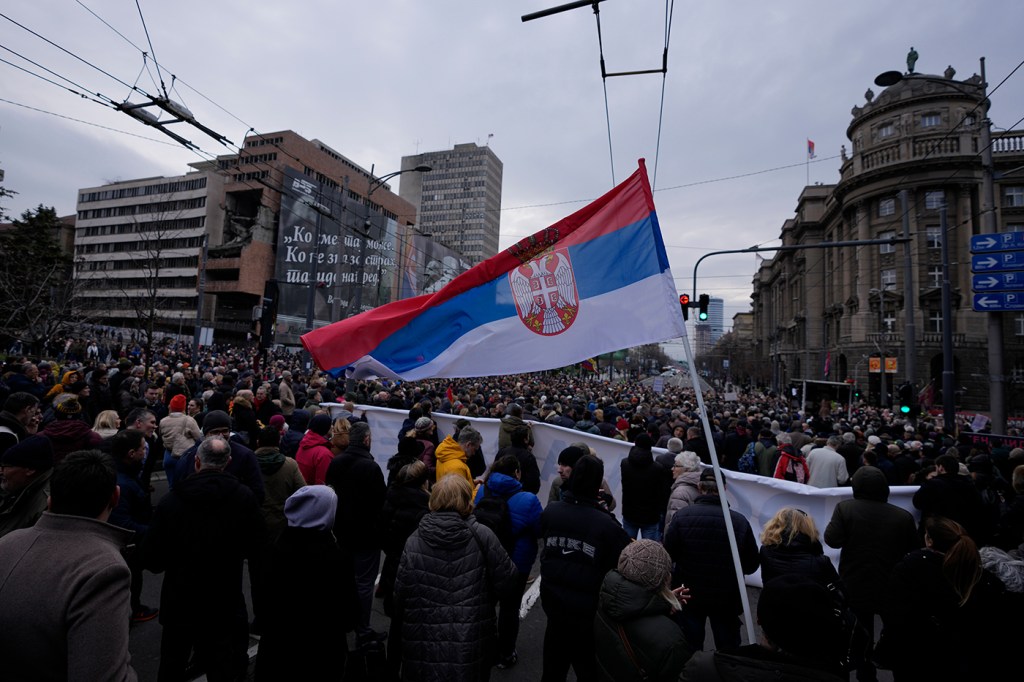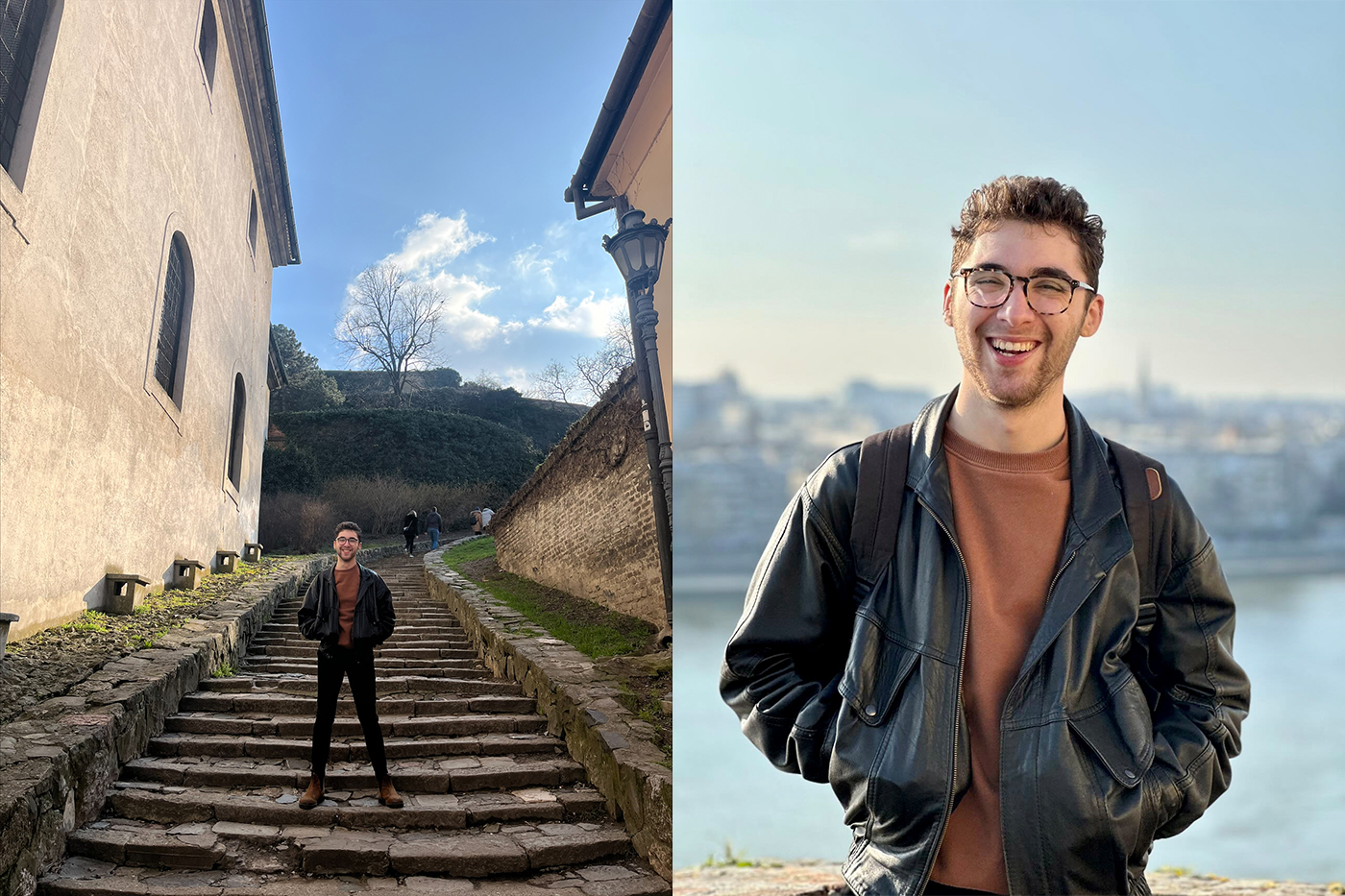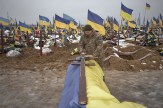‘I’m so glad that I did.’ Northeastern student on co-op learns from Serbian advocates on nonviolent resistance

Zachary Greenwald, a third-year Northeastern student, admits when he first arrived in Belgrade, Serbia, he was a little uncomfortable.
“It’s a really big change going to a different country where people are speaking a completely different language,” he says.
He had gotten lost in Belgrade many times. He had to ask strangers about food products in grocery stores because he couldn’t read or find anything familiar.
And then there was a big difference in political climate—Greenwald detected a general pro-Russia and anti-NATO sentiment in Serbian society.
Once he started talking more to individuals, however, and made friends of his own age—both among Serbs and Russians who had fled Russia due to its aggression in Ukraine—he realized that he had nothing to worry about. People understood that he was much more than just an U.S. citizen and did not necessarily agree with all of America’s foreign policy, just like a Russian individual didn’t necessarily support the Kremlin’s foreign policy, too.

There were also a lot of protests and rallies in Belgrade—almost weekly—Greenwald says, for different causes like negotiations on Kosovo status, violence against women, corruption, LGBTQ rights and in support of Russia in the Russia-Ukraine war. But protests were exactly what Greenwald, who majors in politics, philosophy and economics, came to Serbia for—to study nonviolent civil actions at the Center for Applied Nonviolent Actions and Strategies in Belgrade.
Co-founded by two founding members of Otpor! (“Resistance!”), a movement that played a crucial part in bringing down the Slobodan Milosevic regime in Serbia in the 1990s, CANVAS advocates for the use of nonviolent resistance in the promotion of human rights and democracy worldwide. The group does research, offers consultations, workshops and training and designs university courses and lectures.
“I wanted to get some experience under my belt doing policy research or researching political movements,” Greenwald says. “CANVAS really stood out to me because its focus on activism and political movements was most closely related to what I wanted to do.”
He also chose Serbia among other opportunities because he didn’t think he would visit the country otherwise if he hadn’t gotten the co-op there.
“I’m so glad that I did,” Greenwald says. “Because it opened my eyes to a completely different region of the world that I would have overlooked.”
Last year, Greenwald did his first co-op in Washington, D.C., working as a legislative aide to a senator and learning a lot about the U.S. political system and government. At CANVAS, he widened his perspective by researching different countries, regions and political systems that the center monitors.
He has learned about various aspects of political activism, how political protests and movements spread and what political transitions of power can look like. For example, he studied the recent protests in Iran and how the military came to power in Myanmar in a coup in 2021.
CANVAS experts advocate for an extremely strategic, planned and ordered approach to creating movements, Greenwald says. He has realized that the advocacy events he had been a part of did not have a good strategy behind them.
“It’s been really fascinating and made me rethink the definition of success in a movement,” Greenwald says. “Now that I have this greater understanding of strategic planning, I can be more helpful [as an activist].”
Going to Serbia, Greenwald wanted to experience intense independence, he says. However, he is very grateful to his hosts, who gradually eased him into the job and were helpful with recommendations and explanations of the local way of life.
“People were always super helpful,” Greenwald says, and about half of the time they would strike a conversation.
Greenwald found Serbian people to be very warm, welcoming and talkative. When he needed some assistance in stores, for example, strangers would often strike a conversation with him, asking if he was an American and why he was in Serbia.
“[Serbian] people are also definitely opinionated,” he says.
They do not impose their opinions on others, but if the topic comes up they will make their stance known, Greenwald says, or they will go protest on the streets.
At the same time, Serbians are much more relaxed and do things a lot slower.
“They just do things when they want and enjoy their time doing things more,” he says.
After some time, he has learned to slow down as well.
Greenwald credits his parents for his interest in civic engagement. His father knocks on doors every election season in his home city of Minneapolis, whether it is for a school board candidate or a governor’s race. Greenwald learned from him the importance of understanding who was representing him and making sure that others were also aware of the government and politics in their area.
In 2018, Greenwald helped organize an anti-gun violence walkout in his high school after 17 people were killed and 17 more were injured at Marjory Stoneman Douglas High School in Parkland, Florida. He’s been a part of the Alliance for Civically Engaged Students at Northeastern, participated in climate activism on Boston campus, served as a senator and vice president of sustainability in the student government and was involved in Boston intercollegiate government for a couple of years.
When he shared with his high school friends that he wanted to study politics in college, one of them said they weren’t surprised.
“That makes a lot of sense, because you’re just someone who really likes to be involved,” the friend said. “And politics is just being really involved in society.”
When he first came to Northeastern he really wanted to work in the U.S. Foreign Service.
“But then, the more classes that I take, and the more co-ops that I do, the less I know what I want to do,” he says, “which is sort of a good feeling of realizing I’m interested in a lot of different things.”
He still wants to work across different countries and believes that the knowledge he has gained during this co-op at CANVAS can translate into various jobs in the future, including the Foreign Service.
Alena Kuzub is a Northeastern Global News reporter. Email her at a.kuzub@northeastern.edu. Follow her on Twitter @AlenaKuzub.






